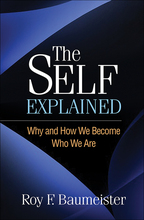The Self Explained
Why and How We Become Who We Are
Roy F. Baumeister
1. What Is the Self?
2. The Self in Social Context
3. How the Modern Western Self Took Shape
4. Different Societies Make Different Kinds of Selves
5. Four Pitfalls of Self Theories: No Self, Multiple Selves, Authentic True Selves, and Self-Actualization
II. Why Do We Have Selves?
6. Some Beginnings of Self
7. How Baby Grows Up to Have a Working Self
8. Human Groups Need (and Shape) Selves 
9. Moral Reputation as a Foundation of Self
10. The Unity Project: The Unfinished Business of Stitching the Self Together
III. Know Thyself
11. Self-Awareness
12. What Sort of Knowledge Is Self-Knowledge?
13. Why Know Thyself?
14. Building Self-Knowledge: How People Learn about Themselves
15. Self-Esteem
16. Accuracy and Illusion in Self-Beliefs
IV. The Self as Active Agent
17. The Self in Action
18. Self-Regulation and Self-Control
19. Decision Making, Autonomy, and Free Will
V. The Self in Relation to Others
20. The Interpersonal Self
21. The Self as Group Member
22. Self-Presentation
23. Self as Close Relationship Partner
VI. Problems of Self
24. Problems of the Modern Self
25. The Stress of Self, and Some Escape Routes
26. Selves and Mental Illness
27. The Deep Puzzle of Self-Defeating Behavior
28. Ways the Mind Can Organize Self-Beliefs
Epilogue. The Self: A Summary




